When young civil rights workers arrived in Ruleville in the Mississippi Delta in 1962, they were looking for local Black people who could help convince their neighbors to register to vote. They found forty-four-year-old Fannie Lou Hamer.
Hamer was attracted to the young people, especially those in the Student Nonviolent Coordinating Committee (SNCC). “They treated us like we were special and we loved ‘em,” she said. “We trusted ‘em.” For the rest of her life, Hamer would work in the Civil Rights Movement on both the state and national stage. She felt that civil rights was her calling, her mission.
Advocate of voting rights
After the meeting at Williams Chapel Church in Ruleville, seventeen people went with Hamer to the Sunflower County seat of Indianola to try to register on August 31, 1962. The prospective voters felt threatened by men with rifles in the back of their pickup trucks who circled the courthouse ominously. At that time, Mississippi required people registering to vote to interpret a randomly selected section of the state constitution, a complicated document. Prospective Black voters inevitably failed the test, whether they were well-educated or not. Even after several years of effort in Sunflower County, by the spring of 1965 only 155 Black people — 1.1 percent of those eligible to vote — were registered, while more than 7,000 White people were registered, or 80 percent of those eligible to vote.
No one was registered that August day. Hamer, who had a booming voice, sang to try to calm people’s fears on the bus taking them home. Years later, Harry Belafonte, who often appeared with Hamer at movement events, said her songs “from the heart would bring another dimension” to the action when people got down to whatever business was at hand. Before or after her speeches, Hamer would inspire her listeners by singing a song that soon became associated with her, “This Little Light of Mine.”
The day of the registration attempt in Indianola, Hamer lost her job on the W. D. Marlow plantation where she had worked as a timekeeper for eighteen years, and where her husband, Perry Hamer, worked as a tractor driver. The owner objected to her attempt to register to vote. Later that fall Hamer attended a SNCC leadership training conference at Fisk University. She then returned to the Indianola courthouse until officials finally allowed her to register to vote that December.
Daughter of sharecroppers
Hamer, born Fannie Lou Townsend on October 6, 1917, in Montgomery County, Mississippi, was the youngest of twenty children. Her parents, Ella and James Lee Townsend, were sharecroppers, which meant that at harvest time, they turned their crops over to the landowner and were paid a small amount for their share. They moved to Sunflower County to work on the E. W. Brandon plantation when Hamer was two years old. By age six, she was weeding the cotton field, then helping to pick the cotton. Hamer went to school through the eighth grade, which was more schooling than many Black children had at the time.
In 1944, Fannie Lou Townsend married Perry Hamer, whom everyone called “Pap,” and they lived on the Marlow plantation outside Ruleville. When Marlow learned that Mrs. Hamer could read and write, he made her the record keeper for the plantation. The Hamers had no children of their own, but they raised two girls from impoverished homes, and later adopted the two daughters of one of them who died. Hamer was respected in both the White and Black communities as someone who could help settle disputes and always had a moment to hear a neighbor’s problem. She had deep religious beliefs; she had been brought up in the church and relied on its strength.
Activist jailed and beaten
Hamer became a SNCC field secretary in early 1963. A few months later, she attended a citizenship training school sponsored by the Southern Christian Leadership Conference (SCLC) in Charleston, South Carolina, to learn how to teach her neighbors about the benefits of citizenship. On the bus trip home in June, the bus made a rest stop in Winona, Mississippi. Annelle Ponder of SCLC, who was traveling with the group, said that three or four of the people went in to the café to be served. They sat at the counter but the waitress refused to serve them. A highway patrolman came from the rear of the café and tapped some of the group on the shoulder with his billy club, saying, “Y’all get out — get out.” Ponder reminded him it was against the law to refuse them service but he said, “Ain’t no damn law, you just get out of here!”
On the way back to the bus, Ponder wrote down the license number of the patrol car and at that, the patrolman and police chief came out of the restaurant and put the cafe group under arrest. As that was occurring, Hamer got off the bus to see whether the rest of the group should go on to Greenwood. The police chief arrested her as well. Later the police had two other Black prisoners beat Hamer and 15-year-old June Johnson, who would not say “sir” to the men. In a trial later that year, an all-white jury acquitted the law officers. Hamer recalled, “After I got out of jail, half dead, I found that Medgar Evers had been shot down in his own yard.”
Delegate to convention
In Freedom Summer 1964, more young people, White and Black, came to Mississippi to join the voting rights effort. Civil rights workers decided to dramatize the discrimination blacks faced in Mississippi by challenging the all-White delegation that would be selected to represent the state at the 1964 Democratic National Convention in Atlantic City, New Jersey. Black people from around the state tried to participate in selecting delegates who would nominate the party’s presidential candidate, but were turned away. They held their own meetings and selected sixty-eight people to represent them at the convention. Aaron Henry, a druggist from Clarksdale and longtime NAACP activist, headed the delegation, and Hamer was the delegation’s vice chair. Naming themselves the Mississippi Freedom Democratic Party (MFDP), they set about trying to generate national support.
At a national convention, the party’s credentials committee considers any challenges and decides who will be seated to vote on the nominees. The MFDP lined up its witnesses, including the Reverend Martin Luther King Jr., the national Civil Rights Movement leader. Hamer gave the most dramatic presentation. Telling about being jailed and beaten, she concluded, “All of this is on account we want to register, to become first-class citizens, and if the Freedom Democratic Party is not seated now, I question America ...”
U.S. Senator Hubert Humphrey, who would become the party’s candidate for vice president, sought a compromise at the request of President Lyndon Johnson that would give the MFDP two seats and the promise of reform for the 1968 convention. That made Hamer angry. “We didn’t come here for no seats ‘cause all of us is tired,” she said. The MFDP delegates rejected the compromise, but the convention delegates did not know that when they voted to accept it, and almost all the White Mississippians walked out.
After the fall election, Hamer and two other women, Victoria Gray Adams of Hattiesburg and Annie Devine of Canton, challenged the seating of the five-member Mississippi Congressional delegation, Thomas G. Abernethy, William Colmer, Prentiss Walker, Jamie L. Whitten, and John Bell Williams. They charged that because Black Mississippians were kept from registering, the election was unfair. Hundreds of their supporters went to Washington when the Congressional session opened in January 1965, and Hamer, Adams, and Devine were given guest seats in the House chamber that day. Yet later, on September 17, 1965, the House of Representatives rejected their challenge, 228-143.
Hamer did not relent in her activities. In 1966, she walked with Dr. King and Andrew Young as they resumed the march against fear that James Meredith had launched across the state. Meredith, who had been the first Black student at the University of Mississippi, had to halt his march when he was shot from ambush. Hamer also raised money to support election activities in two Delta towns. She lost a bid to become a board member for the Sunflower County anti-poverty agency in 1967 because she questioned their authority and the true value of the agency’s programs to poor people. Local White people had united behind her opponent, a Black man.
In 1968 the Democratic Party, which by then required its state parties to integrate, seated Hamer as a delegate at its presidential nominating convention in Chicago. Anti-Vietnam War violence in the streets overshadowed the seating of the integrated Mississippi delegation, but Hamer spoke from the podium on behalf of a challenge to the Alabama party.
Fighter of poverty
That year she started what she called a Pig Bank with the help of the National Council of Negro Women to help people in her community improve their diets. Hamer bought thirty-five gilts (females) and five boars (males), and the pregnant gilts were loaned to local families. They could keep the piglets that were produced and return mama pig to the bank. Some three hundred families benefited from this program. The following year Hamer established Freedom Farm with a similar goal of providing food and some economic independence to local people. She remained active in anti-poverty efforts such as Head Start because she saw the link between education, jobs, and political influence.
In 1970 Hamer filed a lawsuit charging that Sunflower County schools were not properly desegregating. The following year, she joined with feminist activists in founding the National Women’s Political Caucus. She said that women of all different colors should join to form a powerful voting majority in the country. “A white mother is no different from a black mother. The only thing is they haven’t had as many problems. But we cry the same tears.”
Hamer ran for the Mississippi Senate in 1971 against the incumbent, Robert Crook. She campaigned with Carver Randle, an NAACP leader in Indianola who was running for the state House of Representatives. The pair ran on a platform urging that state and local governments hire more minorities for jobs previously held by whites, and to appoint more minorities to government positions. Randle said, “I was impressed with her openness and frankness no matter who was in attendance.” He said Hamer also felt that educated people in the black community “were much better equipped to do what she was doing, yet they didn’t have the fortitude to do it.” Hamer lost the election, 11,770 votes to 7,201.
Ill health filled Hamer’s last years. She had had polio as a child and had been sterilized without her knowledge while hospitalized in 1961. After a lengthy hospitalization for nervous exhaustion in January 1972, she managed to travel that summer to the Democratic National Convention in Miami where she seconded the nomination of Texas Lieutenant Governor Frances “Sissy” Farenthold for vice president. She was hospitalized again in January 1974 for a nervous breakdown, but a few weeks later reported that she felt better than ever. That June a group from Madison, Wisconsin, that had worked with her on Freedom Farm came to Ruleville and found her “in the worst health ever, heavily medicated for pain and dependent on Pap and a neighbor” to keep the household going. In the spring of 1976 she had breast cancer surgery.
These ailments took their toll and she died March 14, 1977, of heart failure brought on by cancer, diabetes, and hypertension. Hundreds of people attended her funeral six days later in Ruleville where Andrew Young, then the U.S. Ambassador to the United Nations, gave her eulogy, saying, “None of us would be where we are now had she not been there then.”
Hamer felt forgotten near the end of her life, which came during an ebb in national interest in the Civil Rights Movement. Years later, however, at least two universities — Jackson State University in Mississippi and California State University, Northridge — named academic institutes in her honor, and in 1993 she was inducted into the National Women’s Hall of Fame in Seneca Falls, New York. The Ruleville post office carries her name today, as do a community center, a memorial park, a youth activities center, and the street on which she lived. Fannie Lou Hamer is remembered.
Kay Mills is the author of This Little Light of Mine: The Life of Fannie Lou Hamer, which was reissued in paperback in fall 2007 by the University Press of Kentucky.
-
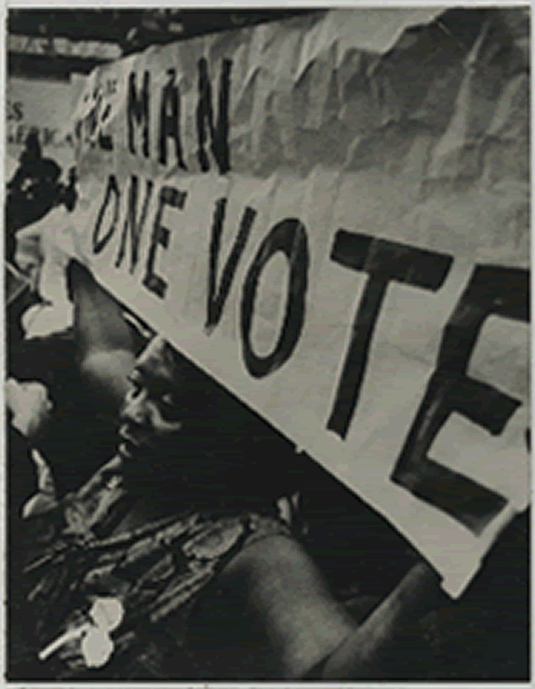
Hamer lifts banner at the 1964 National Democratic Convention. Photograph by Fred DeVan. Photograph courtesy The Tougaloo College Civil Rights Collection at the Mississippi Department of Archives and History -
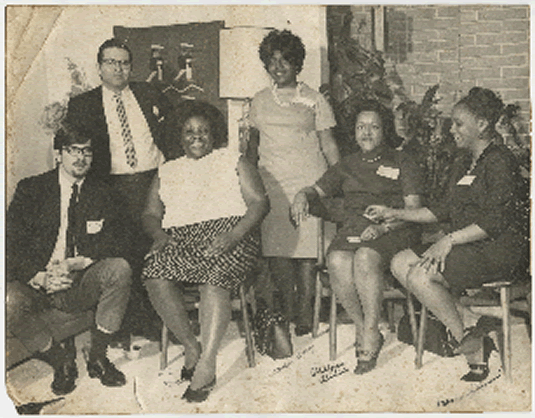
Fannie Lou Hamer, seated at left, at a meeting of the Mississippi Freedom Labor Union, a union of black domestic workers and day laborers. Photograph courtesy The Tougaloo College Civil Rights Collection at the Mississippi Department of Archives and History
-

Hamer, in coat and scarf, helped establish Freedom Farm Cooperative in 1969 with the goal to provide food and some economic independence to local people. Photograph courtesy The Tougaloo College Civil Rights Collection at the Mississippi Department of Archives and History -
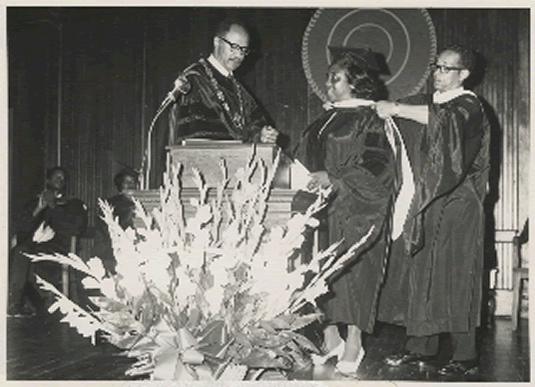
Tougaloo College presents Hamer with doctor of humanities honorary degree in 1969. Photograph courtesy The Tougaloo College Civil Rights Collection at the Mississippi Department of Archives and History -
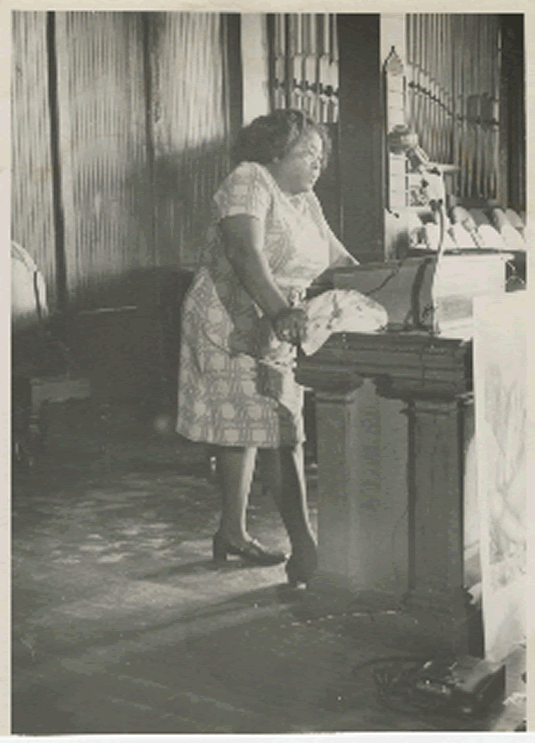
Hamer speaks on Tougaloo College campus, June 1971. Photograph courtesy The Tougaloo College Civil Rights Collection at the Mississippi Department of Archives and History -
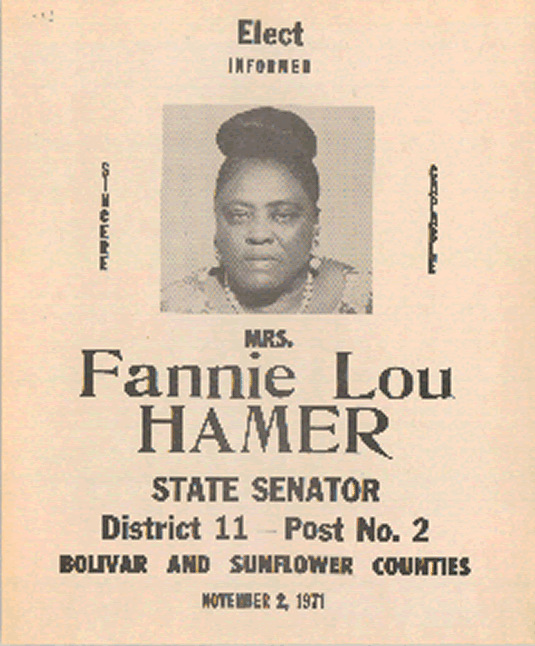
Election poster for Hamer’s 1971 run for the Mississippi Senate. Courtesy The Tougaloo College Civil Rights Collection at the Mississippi Department of Archives and History
Sources and Suggested Readings:
Books
Carson, Clayborne. In Struggle: SNCC and the Black Awakening of the 1960s. Cambridge: Harvard University Press, 1981.
Dittmer, John. Local People: The Struggle for Civil Rights in Mississippi. Urbana: University of Illinois Press, 1994.
Lee, Chana Kai. For Freedom’s Sake: The Life of Fannie Lou Hamer. Urbana: University Press of Illinois, 1999.
Mills, Kay. This Little Light of Mine: The Life of Fannie Lou Hamer. New York: Dutton, 1993.
Articles:
Hamer, Fannie Lou, “To Praise Our Bridges,” Mississippi Writers: Reflections of Childhood and Youth, Vol. II, edited by Dorothy Abbott. Jackson: University Press of Mississippi, 1986, pp. 321-330.
Robertson, Nan, “Mississippian Relates Struggle of Negro in Voter Registration,” The New York Times, August 24, 1964.
Video
“Eyes on the Prize: Mississippi: Is This America? 1962-1964,” PBS documentary produced by Henry Hampton for Blackside, Inc.
Related websites (Accessed April 2007)
https://kinginstitute.stanford.edu/encyclopedia/voter-education-project-vep
http://www.ibiblio.org/sncc/audio.html
